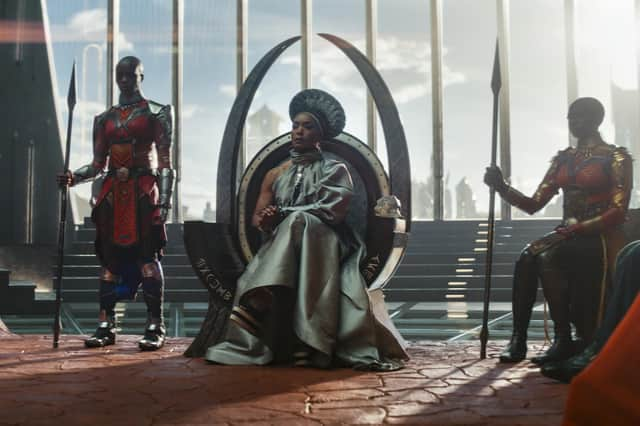Film reviews: Black Panther: Wakanda Forever | No Bears | A Bunch of Amateurs


Black Panther: Wakanda Forever (12A) ***
No Bears (12A) ****
A Bunch of Amateurs (12A) ***
Part extended wake for the late Chadwick Boseman, part mythological reimagining of what a Marvel film can be, Black Panther: Wakanda Forever arrives at a strange time for the hitherto all-conquering Marvel Cinematic Universe. Given the first film was one of the jewels in the crown of Marvel Studios’ industry redefining first decade – a billion-dollar grossing hit with a majority Black cast and Creed director Ryan Coogler – a sequel was always going to happen, even when the character was unceremoniously killed off in his very next outing, becoming a temporary victim of the population-culling “snap” that concluded Avengers: Infinity War. But the shock death of Chadwick Boseman from colon cancer in 2020 forced a big rethink: how exactly do you make a Black Panther sequel without Black Panther?
Rather than recasting the part, Coogler’s answer is to write the death of T’Challa (Black Panther’s civilian alias) into the opening scenes of Wakanda Forever and transform the traditional Marvel credit sequence into a hushed tribute to Boseman’s performance. Thenceforth the action takes place a year on from T’Challa’s demise, with governments from the United Nations still peeved at Wakanda’s unwillingness to share its supply of the indestructible and energy rich mineral known as vibranium. Wakanda itself is now a matriarchy, ruled by Angela Bassett’s Queen Ramonda (the mother of T’Challa), though the focus of the film is really her daughter Shuri (Letitia Wright), T’Challa’s tech-whiz little sister, who has taken his death especially hard.
Advertisement
Hide AdNarratively that’s a bold choice, akin to making the next Bond film all about Ben Wishaw’s Q while they figure out how to replace Daniel Craig. Yet that boldness works for a while, partly because Wright rises to the challenge and partly because it makes the film less predictable, especially as a new threat to the stability of Wakanda (and the world in general) emerges in the form of the Talokan nation, a previously hidden subaquatic race of mutant super beings with their own supply of the aforementioned vibranium
As with the first film, Wakanda Forever works best when it’s deviating from the expected tropes of a superhero film. There’s a great sequence, for instance, when Coogler – filling us in on the backstory of the Talokan king (Tenoch Huerta) – serves up a savage indictment of colonialism that could have come out of Terrence Malick’s The New World. Elsewhere, though, it feels a little sloppy. A big kidnapping subplot is resolved by a character tracking some earrings the kidnapped woman isn’t even wearing and a blistering attack on Wakanda is voluntarily halted by the assailant for no other reason than the plot needs to give Shuri and her fellow Wakandans time to regroup and figure out a way to prevent an all-out war. At close to three hours, this is an epic movie that doesn’t always justify its length.


And yet there is something to be said for the way the film, like Wakanda itself, operates almost entirely independently of the larger MCU. It doesn’t tease us with the promise of something interesting happening three films down the line, nor does it feel the need to fold in heavy hitters from the other Marvel films. It’s got its own story it wants to tell and is confident enough to trust that audiences will go along for the ride.
Like all Jafar Panahi’s work since the Iranian authorities banned him from making films and giving interviews, No Bears is an inventive act of defiance, once again starring the persecuted filmmaker as a version of himself struggling to get a film made. In this instance, the film he’s trying to shoot is a docudrama about an Iranian couple holed up in nearby Turkey as they desperately try to secure passage to Europe. Kicking off as a conventional film, it soon takes on the meta characteristics of This is Not a Film and Taxi Tehran via a seamless pull-back shot that reveals Panahi is directing the action remotely from a mountainous village near the Turkish border.
This in itself is a precarious location for the filmmaker, who will soon becomes embroiled in another story involving a young couple whose hitherto clandestine affair has the villagers up in arms. The drama hinges on whether or not Panahi has taken a picture of them while documenting village life on a whim, a plot point he spins into a remarkable interrogation of the damaging power people ascribe to some images and stories and not others. The film’s quiet anger and poignancy is even more acute in the wake of Panahi’s recent imprisonment.
A sometimes heartening, sometimes exasperating exploration of the power of filmmaking, A Bunch of Amateurs zeroes in on the ailing Bradford Movie Makers, one of the last remaining amateur filmmaking clubs in the north of England. With its existence threatened by ageing membership, waning interest and mounting debts, director Kim Hopkins attempts to show how the very act of making and screening films offers some much-needed respite from their everyday troubles. Judging from the clips of their work Hopkins includes, there’s not much filmmaking talent going undiscovered here, but that’s not the point. The act of doing it provides a creative outlet and sense of community, even if some are prone to delusional bouts of egomania. The onset of Covid brings with it a surprise silver lining, but Hopkins’ attempts to turn the club’s far-from-certain-future into a comment on the precarious state of the film industry feel a little strained.
All films on general release from Friday